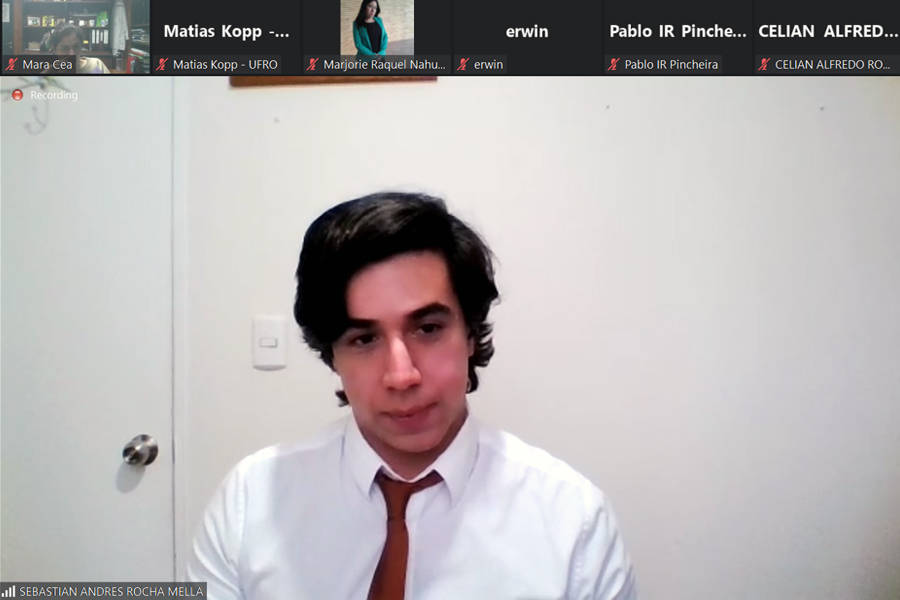|
What seemed to be a future innovation became a reality: the replacement of polyethylene terephthalate (PET), a plastic material used in the manufacturing of bottles, with a polymer extracted from sugar beets. |
Dr. Sebastián Rocha Mella is the fifth graduate of the Doctoral Program in Engineering Sciences with specialization in Bioprocesses of the Universidad de La Frontera (UFRO). In his doctoral thesis, he worked on finding a sustainable and environmentally friendly solution to the use of plastics. In this regard, Dr. Rocha points out that beet molasses, an industrial by-product, has a high sugar content. On this basis, a process was developed and assessed that is capable of transforming the saccharides contained in beet molasses into a 5-hydroxymethylfurfural (HMF) compound through the use of microwaves, a technology that allows the dehydration of these sugars, a procedure that leads to obtaining HMF. HMF is a compound in great demand these days, although in reality, it is an intermediate product. Thus, Dr. Rocha comments: “The work for my thesis shows that after the extraction of HMF and the biochemical oxidation by microorganisms, it is possible to obtain products of even greater value, obtaining 2.5-Furandicarboxylic acid (FDCA). Its main characteristic is that it is a raw material in the production of plastics, called Polyethylene Furanoate (PEF), a plastic made from biomass, which is very different compared to the current plastics, mainly derived from petroleum.” This becomes even more relevant since the annual plastic consumption in Chile reaches 990,000 tons, of which only 83,700 tons are recycled. That is an equivalent of only 8% of the total, according to a study carried out in 2019 by the Chilean Plastics Industry Association (ASIPLA). Considering the percentage of recycled material, it is also clear that within the total amount of plastic material of household origin, PET bottles represent 52.2 % of the total. Regarding the impact of his research, Dr. Rocha points out: “We need to develop technologies that are efficient and environmentally friendly, being aware that we cannot always depend on fossil resources. I am sure that this study will directly contribute to this issue and to the development of new technologies to produce biomass fuels and materials that are more sustainable and accessible for countries like Chile, since we do not have direct access to petroleum, which is the primary basis for the production of PET.” A NEW DOCTOR IN BIOPROCESSES AT UFRO “I strongly believe that technological development is what will help our country to move forward,” says Dr. Sebastián Rocha Mella, the fifth graduate of the Doctoral Program in Engineering Sciences with specialization in Bioprocesses of the Universidad de La Frontera. One of the obstacles he had to overcome to reach his goal of developing research with a social and environmental impact and obtaining his doctor’s degree was the pandemic and the restrictions that came with it. Nevertheless, although he had to carry out his experiments in the capital city, Santiago de Chile, in the middle of this complicated situation and although he lost the opportunity to go to the University of Groningen (Netherlands) due to the pandemic, his research went much better than he thought it would under these circumstances. With regard to his presentation, he indicates: “Considering all presentations I had to give in my life, I had never been as nervous as in this one. However, I was also confident that the result would be good and I knew that I would be much calmer after finishing this final exam. Now I am planning to open a new line of research, because although my work is similar to what was done at the Waste and Energy Management Center, there was nothing specific yet regarding what I do. I think that this is a great opportunity to open a new research line and to diversify the possibilities of creating high-impact studies beyond the publications, because I strongly believe that technological development is what will help our country to move forward.” The evaluation committee consisted of Dr. Edgar Uquiche, the director of the doctoral program; Dr. María Cristina Area of the Argentinian university Universidad Nacional de Misiones; Dr. Danilo Pérez of the university Universidad Tecnológica Metropolitana in Santiago de Chile; and Dr. María Eugenia González and Dr. Gustavo Ciudad of UFRO. They graded Sebastián Rocha's degree exam with the best grade (7.0), becoming the fifth graduate of the Doctoral Program in Engineering Sciences with specialization in Bioprocesses of UFRO, under the guidance of his doctoral supervisor, the outstanding academic Dr. Mara Cea Lemus. Written by: Doctoral Program in Engineering Sciences with specialization in Bioprocesses, UFRO |





